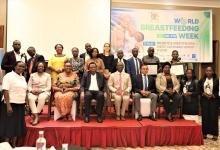Uganda rallies support for breastfeeding as a cornerstone of health and development
Kampala, Uganda – Uganda joined the global community in commemorating World Breastfeeding Week 2025 with a high-level breakfast meeting in Kampala under the theme: “Invest in Breastfeeding, Invest in the Future.” The theme aligns with World Health Organization (WHO)’s ongoing campaign dubbed “Healthy beginnings, hopeful futures”, that urges governments and the health community to intensify efforts to end preventable maternal and newborn deaths and prioritize women’s long-term health and well-being.
The commemorative event brought together key stakeholders from government, development partners, civil society, and the UN family to reaffirm their commitment to promoting breastfeeding as a cornerstone of child survival, maternal health, and national development.
“Every mother needs a strong network of support at home, in the workplace, within communities, and at health facilities,” said Dr Charles Olaro, the Director General of health services in the Ministry of Health. “Support means access to accurate information, skilled healthcare, and an environment that empowers mothers to overcome challenges and give their children the healthiest start in life.”
According to the 2023 Lancet series on breastfeeding, less than half of the babies worldwide are breastfed in accordance with WHO recommendations, and 60% of mothers do not breastfeed for as long as they intend. Unsupportive work policies and limited parental leave have been identified as major barriers. Globally, an estimated 500 million working women lack access to essential maternity provisions and are unsupported when they return to work. This affects successful breastfeeding, and many times mothers turn to formula and/or cow’s milk with various possible side effects including malnutrition and allergic conditions in poorly breastfed infants.
Over the last 10 years, Uganda has made significant strides in breastfeeding practices. According to the Uganda Demographic and Health Survey 2022, exclusive breastfeeding rates among children aged 0–6 months have increased to 94%, with 96% of children having been breastfed at least once. Additionally, 82% of newborns were breastfed within one hour of birth, and 86% experienced skin-to-skin contact with their mothers in the first hour—key practices for successful breastfeeding.
Despite these gains, a lot remains to be done to sustain them and improve further. Uganda’s maternity leave policy provides 60 working days (approximately two months). Many mothers discontinue breastfeeding upon returning to work due to unsupportive environments, such as the lack of breastfeeding rooms or flexible schedules.
“Many employers view breastfeeding as a disruption to productivity, but these women are nurturing the future generation,” said Dr. Kasonde Mwinga, WHO Representative in Uganda. “They deserve our full support to raise healthy children who will contribute to the country’s socioeconomic development.”
The meeting emphasized evidence-based interventions to sustain and improve breastfeeding outcomes. These include developing national guidelines, advocating for political and financial support, regulating the marketing of breast-milk substitutes, and training health workers to provide skilled breastfeeding support and monitor child growth. A special call was made to support the establishment of breast milk banks across Uganda, particularly to serve premature and vulnerable newborns. This initiative was recognized as a critical step towards in ensuring equitable access to nutrition for all infants.
As Uganda joins the global community in celebrating World Breastfeeding Week, the call to action is unmistakable: breastfeeding must be recognized as a collective responsibility, supported by inclusive policies and societal structures that address gender inequities. It is not solely a maternal duty, but a national imperative that demands investment, collaboration, and sustained commitment. By empowering mothers and creating enabling environments, Uganda is not just nourishing its children—it is securing the health, resilience, and prosperity of future generations.
